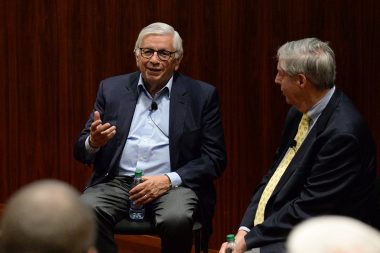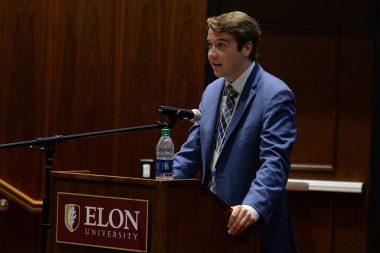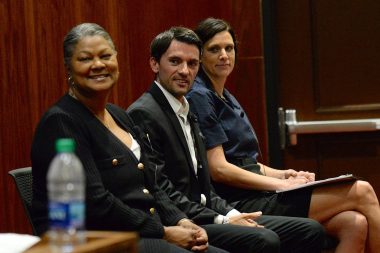Former NBA Commissioner David Stern’s keynote address provided the kickoff for the inaugural symposium, featuring two panel discussions about the legalization and regulation of sports betting and its potential business impact across North Carolina and elsewhere.
For sports fans, the phrase “The Process” is synonymous with the NBA. The expression usually involves the drastic and methodical rebuild of the Philadelphia Sixers, a polarizing topic among casual professional basketball viewers and talking heads alike.

Stern kicked off the on-campus symposium, titled “Sports Betting: The Industry’s Next Frontier,” reflecting on the NBA’s very public endorsement of the legalization of sports gambling as well as prognosticating about the aftereffects of the Supreme Court’s 2018 decision to lift a federal ban on sports betting.
Directed by questions from Visiting Professor Bill Squadron, Stern’s address was part of an afternoon conversation about the legalization and regulation of sports betting and its potential business impact in the sport industry. Just two weeks ago, the N.C. Senate passed a bill that would permit wagering on sports and horse racing at tribal casinos.
In addition to Stern’s address, the symposium featured two panel discussions, titled “The Business Impact of Sports Betting on the Industry” and “Legalizing and Regulating Sports Betting,” respectively.

For photos from the symposium, visit the School of Communications’ Flickr account.
As commissioner, Stern recalled that he testified against the legalization of sports betting, but near the end of his tenure came to accept the idea. In fact, the arrival of daily fantasy sports earlier this decade was the move that finally swayed him and the league to embrace sports betting – the last straw as the sport industry moved closer to legalized gaming.
Multiple panelists referenced the significance of the 2014 New York Times op-ed penned by Stern’s successor, Adam Silver, supporting the legalization of sports gambling with regulation. At that time, Silver’s reasoning centered on the normalization of sports gambling in today’s culture and the need to regulate the industry, rather than allowing it to continue in the shadows.
“I threw up my hands and said, ‘How are you going to stop the tide?’” Stern said, following the growing popularity of daily fantasy. “Our opposition melted away.”
After long opposing gambling, and keeping a distance from Las Vegas, the NBA’s decision to reverse field didn’t occur in a single move.
“It was a process,” Stern said.

Admittedly, Stern had reservations that betting could influence the loyalty and passion of fans. He shared a fictional narrative about a Knicks’ fan and his son leaving Madison Square Garden disappointed that, although the home team won, they were upset the Knicks didn’t cover the points spread – essentially, the team didn’t win by enough. Additionally, Stern doesn’t favor betting on individual player performance, which could lead to intensified scrutiny.
But, ultimately, the opportunity to engage fans is too powerful.
“It’s good for business,” said Stern of regulated sports betting. Good for the leagues, teams and players, and will raise TV ratings and sponsorship opportunities.
“Plus, it will put dollars in the coffers of the state,” he added. “(Sports betting) has its risks … but we will get past them.”
In the first discussion, panelists underscored the significant revenue impact for leagues and networks from a whole new sponsorship and advertising category.
“It would be a new touchpoint, bringing in the casual fan. Plus, we’d have more engagement with (current) fans,” said Scott Warfield, managing director of gaming at NASCAR.
Elon alumna Monica Fee, property sales agent at CAA Sports, noted that sports betting is already legal and successful in Europe, providing numerous opportunities for sponsorships of teams.
For Peter Scott, vice president of emerging media for Turner Sports, the real appeal of sports betting is the chance to better engage fans in a crowded entertainment marketplace.
“We are all in the attention business. We need to find out what is important to you … to make you stay longer,” he said. Scott noted the growing popularity of second-screen viewing, engaging fans beyond the typical broadcast. Legalized betting could only enhance this option, he said.

“Baseball is over the moon about the opportunity,” Master said.
In the closing panel, Sarah Slane, whom Squadron called one of the leading authorities on sports gambling, offered insights on behalf of the American Gaming Association, outlining how regulation works across various states, and what North Carolina would need to move its proposed bill forward.
While working from different sides of the aisle, Democratic Rep. Carla Cunningham and Republican Rep. Jon Hardister agreed, if regulated effectively, the state should consider the opportunities to add a new revenue source. This new money could support areas such as infrastructure, health care, law enforcement and teacher pay.
“We are already a gambling state,” Cunningham said, referencing the state lottery system. “We need to keep jobs in state, keep revenue in state.”
Associate Professor Hal Walker’s Event Management class helped coordinate the symposium, overseeing the event’s marketing, ticketing and logistics.
For more about the symposium, the Raleigh News & Observer, Burlington Times-News and Elon News Network also provided event coverage.


